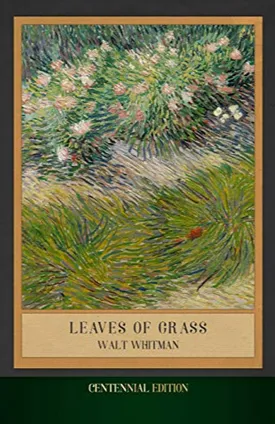The famous collection of poems Leaves of Grass by Walt Whitman was first published in 1855 and was constantly updated throughout the length of the poet’s life. Considered both Whitman’s magnum opus and an essential piece of American literature, Leaves of Grass was quite radical for its time, as it set out to challenge the form and style of the English sonnet. In Whitman’s work, America and the world were represented as a whole, individual experience was valued and celebrated, and death was not feared but embraced. The collection also played an important role in setting the groundwork for modern American poetry.
Leaves of Grass consists of twelve distinct parts: ‘Inscriptions’, ‘Starting from Paumanok’, ‘Song of Myself’, ‘A Word Out of the Sea’, ‘The Sleepers’, ‘Crossing Brooklyn Ferry’, ‘Song of the Answerer’, ‘By Blue Ontario’s Shore’, ‘Song of the Open Road’, ‘Spontaneous Me’, ‘Prayer of Columbus’ and ‘To Think of Time’.
The poem ‘Song of Myself’ is a key section of the collection, as it sets up the overall theme of interconnectedness and humanity that is the foundation for Whitman’s writing. In this poem, Whitman speaks to each of us as equals, encouraging us to celebrate life and appreciate the interconnectedness of humans, nature and all of existence. In the poem, Whitman addresses the idea of death, saying that death is just another part of the cycle of life and should be embraced as an opportunity to further one’s development.
The other sections of Leaves of Grass, while all sharing a similar theme and writing style, encompass a diverse array of topics, ranging from the expansive and expansive truths of life as represented in ‘Crossing Brooklyn Ferry’ to the more poetic components of ‘By Blue Ontario’s Shore’ and ‘Spontaneous Me’.
Throughout Leaves of Grass, Whitman includes pieces of his life and the experiences that shaped him. In the ‘Inscriptions’ section, he pays tribute to his friends and mentors, as well as recognizing his passing from childhood to adulthood. In ‘Starting from Paumanok’, he reflects on his own experiences growing up in a rural Long Island town. In ‘The Sleepers’, Whitman muses about dreams, mortality, and the power of human imagination.
The collection is considered to have a uniquely American flavor, as it celebrates the country’s values of freedom and equality, while simultaneously celebrating the individual experience and embracing death as part of life’s natural cycle.
The lasting impact of Leaves of Grass is reflected in the fact that it remains widely read and studied today, as modern readers can now identify with the poet’s messages and values. Whitman’s collection of poems serves as a reminder that while our individual dreams and experiences may differ, we are all connected and part of the same collective experience. Furthermore, Leaves of Grass set an essential precedent for the development of modern American poetry, as Whitman’s unique writing style and themes gave birth to the innovative and experimental works of literary figures like T.S. Eliot and Ezra Pound.

